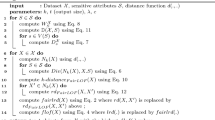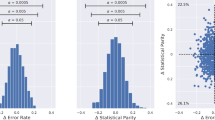Abstract
Ensuring fairness in anomaly detection models has received much attention recently as many anomaly detection applications involve human beings. However, existing fair anomaly detection approaches mainly focus on association-based fairness notions. In this work, we target counterfactual fairness, which is a prevalent causation-based fairness notion. The goal of counterfactually fair anomaly detection is to ensure that the detection outcome of an individual in the factual world is the same as that in the counterfactual world where the individual had belonged to a different group. To this end, we propose a counterfactually fair anomaly detection (CFAD) framework which consists of two phases, counterfactual data generation and fair anomaly detection. Experimental results on a synthetic dataset and two real datasets show that CFAD can effectively detect anomalies as well as ensure counterfactual fairness.
Access this chapter
Tax calculation will be finalised at checkout
Purchases are for personal use only
Similar content being viewed by others
References
Almanza, M., Epasto, A., Panconesi, A., Re, G.: k-clustering with fair outliers. In: WSDM. ACM (2022)
van Breugel, B., Kyono, T., Berrevoets, J., van der Schaar, M.: DECAF: generating fair synthetic data using causally-aware generative networks. In: NeurIPS (2021)
Deepak, P., Abraham, S.S.: Fair Outlier Detection. In: WISE (2020)
Dressel, J., Farid, H.: The accuracy, fairness, and limits of predicting recidivism. Sci. Adv. 4(1), eaao5580 (2018)
Dua, D., Graff, C.: UCI machine learning repository (2017). http://archive.ics.uci.edu/ml
Edwards, H., Storkey, A.: Censoring representations with an adversary. arXiv:1511.05897 (2016)
He, S., Zhu, J., He, P., Lyu, M.R.: Experience report: System log analysis for anomaly detection. In: ISSRE. IEEE (2016)
Kilbertus, N., Rojas-Carulla, M., Parascandolo, G., Hardt, M., Janzing, D., Schölkopf, B.: Avoiding discrimination through causal reasoning. In: NIPS (2017)
Kusner, M.J., Loftus, J.R., Russell, C., Silva, R.: Counterfactual Fairness. In: NeurIPS (2018)
Madras, D., Creager, E., Pitassi, T., Zemel, R.: learning adversarially fair and transferable representations. arXiv:1802.06309 (2018)
Nabi, R., Shpitser, I.: Fair inference on outcomes. In: AAAI (2018)
Ng, I., Zhu, S., Chen, Z., Fang, Z.: A graph autoencoder approach to causal structure learning. In: NeurIPS Workshop on Machine Learning and Causal Inference for Improved Decision Making (2019)
Pearl, J.: Causality, 2nd edn. Cambridge University Press, Cambridge (2009)
Shekhar, S., Shah, N., Akoglu, L.: FairOD: fairness-aware outlier detection. In: AIES. AAAI/ACM (2021)
Song, H., Li, P., Liu, H.: Deep clustering based fair outlier detection. In: SIGKDD. ACM (2021)
Zhang, H., Davidson, I.: Towards fair deep anomaly detection. In: FAcct. ACM (2021)
Zheng, X., Aragam, B., Ravikumar, P.K., Xing, E.P.: DAGs with no tears: continuous optimization for structure learning. In: NeurIPS (2018)
Acknowledgement
This work was supported in part by NSF 1910284 and 2103829.
Author information
Authors and Affiliations
Corresponding author
Editor information
Editors and Affiliations
Rights and permissions
Copyright information
© 2023 The Author(s), under exclusive license to Springer Nature Switzerland AG
About this paper
Cite this paper
Han, X., Zhang, L., Wu, Y., Yuan, S. (2023). Achieving Counterfactual Fairness for Anomaly Detection. In: Kashima, H., Ide, T., Peng, WC. (eds) Advances in Knowledge Discovery and Data Mining. PAKDD 2023. Lecture Notes in Computer Science(), vol 13935. Springer, Cham. https://doi.org/10.1007/978-3-031-33374-3_5
Download citation
DOI: https://doi.org/10.1007/978-3-031-33374-3_5
Published:
Publisher Name: Springer, Cham
Print ISBN: 978-3-031-33373-6
Online ISBN: 978-3-031-33374-3
eBook Packages: Computer ScienceComputer Science (R0)




